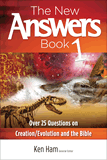The Crucifixion
On the day often called Good Friday, many Christians will commemorate the Crucifixion of Jesus Christ. The Creator put on human flesh and died a horrific death on the Cross. Rather than worshipping Him as their Creator and God, most people rejected Him and sentenced Him to death. How could the day associated with mankind’s heinous act possibly be called good?
The answer to this question is found in the purpose for Christ’s death. Jesus said that He “did not come to be served, but to serve, and to give His life a ransom for many
” (Matthew 20:28). Since we have all sinned against the infinitely holy God, we deserve to pay the price for our rebellion—death (Romans 3:23). But praise God for His mercy and grace! Rather than condemning us for our sin, the Bible tells us that God so loved the world that He sent His only begotten Son to take the punishment we deserve (John 3:16; 1 John 4:10; 2 Corinthians 5:21).
Consider this incredible truth. The omnipotent Creator loves us enough to humble Himself to the point of dying on the Cross for our sins (Philippians 2:8; Isaiah 53:5, 8). Jesus spoke about this type of love to His disciples on the night before He laid down His life for sinners. He stated, “Greater love has no one than this, than to lay down one’s life for his friends
” (John 15:13). Not only did Christ give them a lesson about the self-sacrificing nature of true love, but He likely alluded to His impending death on the Cross, which He had already explained to them on previous occasions (Matthew 20:17–19).
Jesus endured unimaginable torment for us. He was rejected by His own people, spat upon, beaten, mocked, and scourged. These sufferings led to His sacrificial death on the Cross and subsequent Resurrection, which paid the price for our sins, satisfied the justice and wrath of the Father, and gave us the certain hope of eternal life with Him.
How could we ever adequately respond to this immeasurable gift? Our words could never sufficiently express the gratitude owed to our Savior. Some of our greatest songwriters have attempted to capture the beautiful truth of Christ’s sacrifice, but even their exceptional words fall short. Perhaps Isaac Watts came the closest in his magnificent hymn, “When I Survey the Wondrous Cross.”
When I survey the wondrous cross
On which the Prince of glory died,
My richest gain I count but loss,
And pour contempt on all my pride.Forbid it, Lord, that I should boast,
Save in the death of Christ, my God;
All the vain things that charm me most,
I sacrifice them to His blood.See, from His head, His hands, His feet,
Sorrow and love flow mingled down;
Did e’er such love and sorrow meet,
Or thorns compose so rich a crown?Were the whole realm of nature mine,
That were a present far too small;
Love so amazing, so divine,
Demands my soul, my life, my all.
We have no reason to boast in ourselves because Jesus paid our entire sin debt—we were unable to appease the wrath of a holy God on our own. Praise God that salvation is freely given to those who turn from their sins and believe on the Lord Jesus Christ! As Watts concluded, “Love so amazing, so divine, demands my soul, my life, my all.”
So as you reflect on what Christ did for you nearly 2,000 years ago, commit yourself to giving Him your soul, your life, and your all.
Recommended Resources

Answers in Genesis is an apologetics ministry, dedicated to helping Christians defend their faith and proclaim the good news of Jesus Christ.
- Customer Service 800.778.3390
- © 2025 Answers in Genesis









